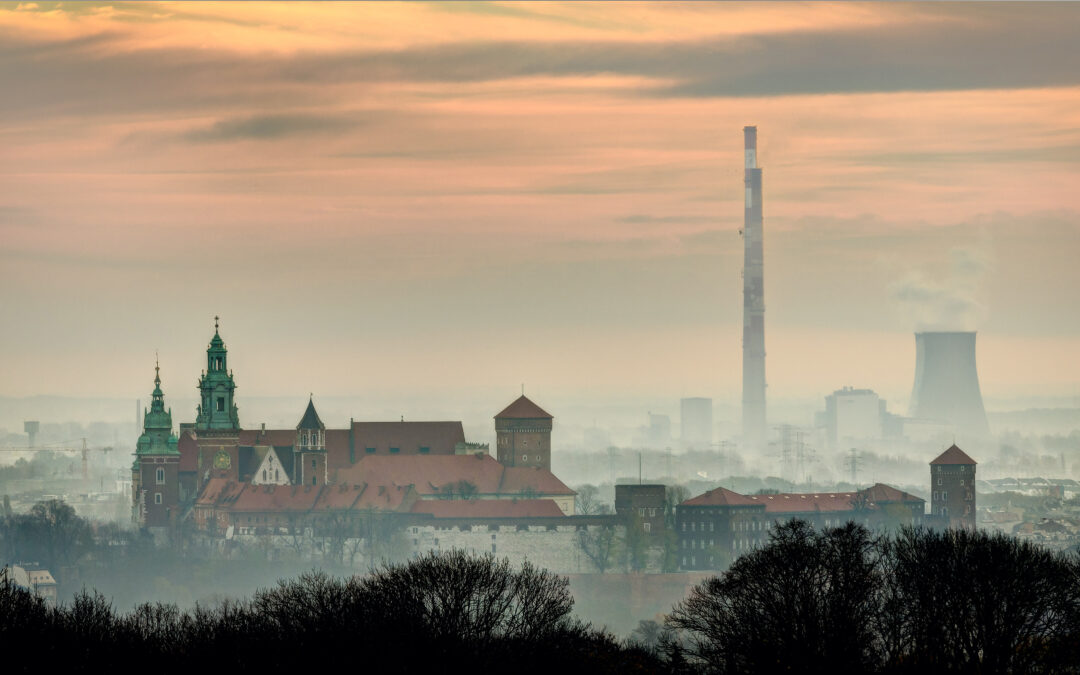The Polish city of Kraków registered the third worst air pollution in the world this morning, as Poland once again suffers from its annual winter smog problems. The country has Europe’s worst air, with pollutants causing tens of thousands of premature deaths annually.
According to the live ranking produced by IQAir, a Swiss air quality technology company, this morning Kraków was the city with the third worst air quality in the world, behind only Lahore in Pakistan and Delhi in India, reports Radio Eska. Warsaw was 13th on the list.
The European Air Quality Index – which is compiled by the European Environment Agency (EEA), an EU body, and uses slightly different methodology – also showed southern Poland as having the worst air on the continent this morning.
However, it found Silesia Province – especially the cities of Katowice and Bielsko-Biała – to have higher pollution levels (with the worst classification of “extremely poor”) than Kraków (which was “very poor”).

Poland, and in particular the south of the country, has been hit by poor air quality in recent days, with pollution indicators in many places far exceeding safe levels.
In Kraków this morning, pollutants were three times over the permissible maximum safe level. Figures in many surrounding towns and villages were even worse – the nearby village of Racławice was 11 times over the limit, reports Gazeta Wyborcza. Katowice was yesterday 2.5 times above safe levels.
Public transport was free yesterday in Kraków, after the city crossed an air pollution threshold at which the authorities drop fees for buses and trams in an effort to discourage people from using cars.
An aerial picture taken with a drone shows a wispy blanket of smog over Krakow, southern Poland, 11 January 2021. 📷 epa-efe / pap / Lukasz Gagulski#Krakow #Poland #smog #airpollution #pollution #environment #photojournalism #epaphotos pic.twitter.com/UxFAgAVl7f
— european pressphoto agency (@epaphotos) January 12, 2021
As well as vehicle exhausts, a major contributor to Poland’s smog is the widespread burning of dirty fuels – including coal, but also sometimes household waste – to heat homes. Incinerating rubbish is illegal, and in 2019 Kraków became the first city in Poland to ban the burning of coal and wood too.
The city also launched an app that allows residents to not only be updated on air quality, but also to report any houses they suspect of burning illegal materials (with brown smoke from chimneys often a giveaway). A geotagged photo can be submitted via the app.
As a result of such efforts – which have also included the use of drones to check what is being emitted from chimneys – the city has noted an improvement in air quality, although there are still a significant number of smoggy days.
Great news for residents of Kraków. Last year we had Poland's 9th most air pollution but this year we've dropped out of @alarm_smogowy's ranking completely
Kraków has taken a lot of steps to tackle smog, including becoming the first Polish city to ban burning coal & wood at home pic.twitter.com/Cj9yPxjuxR
— Daniel Tilles (@danieltilles1) November 30, 2020
In November, a report by the EEA identified Poland as having the European Union’s most polluted air. Its data showed that pollution in almost all areas of the country exceed European air standards, and that air pollutants caused nearly 50,000 premature deaths in Poland in 2018.
Earlier in the year, a ranking by the Air Quality Life Index (AQLI) also found Poland to have the most polluted air in Europe. In 2018, the World Health Organisation found that 36 of the EU’s most polluted cities were in Poland.
To tackle this longstanding problem, the government in 2018 launched a “Clean Air” programme – theoretically one of the largest of its kind in Europe – which aimed to reduce smog by providing households with funds to replace old heaters and to improve insulation.
However, the initiative has not had the hoped-for impact. Poor implementation and resultant low take-up of the subsidies led the European Commission to consider withdrawing funding for the programme.
Poles living in rural communities had particular difficulties in accessing funds. In September, the climate ministry moved to close a loophole that had previously left many of the poorest households excluded from subsidies.
The same month, the ministry unveiled an updated energy strategy for the next two decades, which outlines a faster withdrawal from coal than previously planned. Soon after, a landmark agreement concluded between the government and mining unions pledged to close all coal mines by 2049.
A government scheme to subsidise the installation of solar panels in private homes has also been a success, with funds designated for the programme already running low.
This winter, Polish Smog Alert, a grassroots social movement, is again running a “See What You Breathe” campaign, during which giant “breathing” lung installations have been touring Polish towns and cities to show residents how much pollution they are inhaling on a daily basis.

Daniel Tilles is editor-in-chief of Notes from Poland. He has written on Polish affairs for a wide range of publications, including Foreign Policy, POLITICO Europe, EUobserver and Dziennik Gazeta Prawna.




















